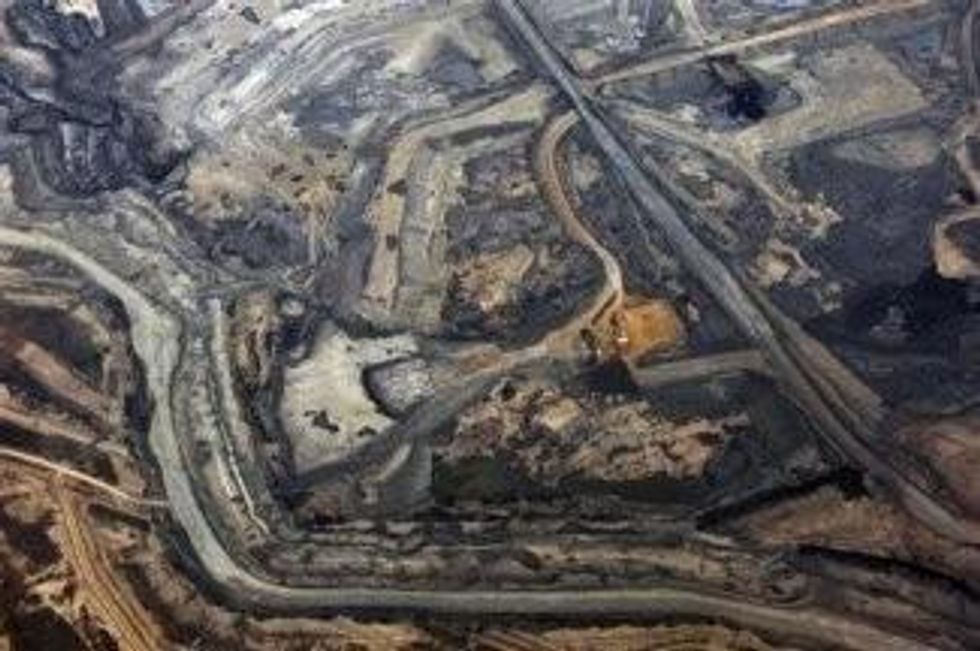The battle over the Keystone XL tar sands oil pipeline continues in the US Senate where Republican senators are trying to find a way to force White House approval of the project, including attaching a measure to the federal transportation bill this week or by tying future oil sales from the Strategic Petroleum Reserve to pipeline approval.
Meanwhile, landowners along the route of the proposed pipeline are being "bullied" by TransCanada, the Canadian company behind the project, who has threatened to invoke 'eminent domain' to 'condemn' family farms and private property.
And, across the ocean, eight Nobel laureates today wrote an open letter to European leaders to support EU classification of tar sands oil as a 'highly polluting' fuel source.
"It's not your mom's every day crude oil pipeline." -Texas Farmer Julia Crawford
The Houston Chronicle tells the story of how Texas farmer, Julia Trigg Crawford, who manages her family's 6000-acre in Lamar County, is challenging TransCanada's right to common-carrier status and eminent domain on her land. According to their report:
She said her father had been talking with the company for a few years, then the family got a letter in August mentioning the use of eminent domain. The next the family heard, she said, the land had been condemned, an action they're appealing.
"What I'm asking for is for people to fully understand the process, and the inequities," she said, contending the state should have a more rigorous process for a company to prove it's a common carrier entitled to eminent domain. "My hope is that our state leaders will see that their landowners in the state are being bullied and that they need to have better legislation."
Crawford said she's concerned about the product that will be carried in the pipeline and worried about potential water contamination [...] "It's not your mom's every day crude oil pipeline," she said.
Lawyers for TransCanada and the Crawford Family will square off at a hearing on Friday that could determine whether to approve the Calgary-based company's petition to condemn the property under eminent domain laws.
The Windsor Star (Canada) reports:
The Crawford family contends TransCanada has failed to provide a required "material safety data sheet" detailing the nature of the product to be shipped through Keystone XL.
"The only way you can negotiate with somebody in good faith is for them to tell you what they going to transport in the pipeline," said Pieratt. "How else will they know how to appreciate the dangers or the environmental pollution, or anything else, without that knowledge?"
The landowners also claim TransCanada has done a "slipshod" study of the archeological impact of building the pipeline across the land, said Pieratt.
The property includes an area with archeological artifacts and earthen mounds from the Caddo Indians.
Several activists, according to the Houston Chronicle, accused the company of using the eminent domain process "to bully landowners and condemn private property."
***
Senators Take Emergency Oil Reserve Hostage to Force Keystone Approval
Think Progress reports today:
Republican Congressional leaders have failed to force President Obama to approve the Keystone XL pipeline. But that's not stopping them from trying over and over again, taking hostages in the process.
First they used the payroll tax cut extension as a vehicle to force a decision on the pipeline in sixty days, even before the final route was identified. President Obama was forced to disapprove the permit because there was no time to assess its potential pollution.
This week, several senators took a different hostage: our emergency oil supply. On February 13, Senators David Vitter (R-LA), John Hoevan (R-ND), and Richard Lugar (R-IN) introduced the Strategic Petroleum Supplies Act, S. 2100 that would prevent President Obama from selling oil from the Strategic Petroleum Reserve unless Keystone is approved:
"the Administration shall not authorize a sale of petroleum products from the Strategic Petroleum Reserve... until the date on which all permits necessary ... for the Keystone XL pipeline project application filed on September 19, 2008 (including amendments) have been issued."
In other words, unless the president approves Keystone, he cannot sell our emergency oil -- even if Iran causes an oil supply disruption in the Strait of Hormuz, a hurricane or other disaster disables oil production or refining facilities, or any other type of event causes gasoline prices to soar above $4 per gallon. If any of these events happen, middle class Americans would pay significantly higher gasoline pump prices, giving billions of dollars more to big oil companies that made record profits last year.
Nobel winners urge EU leaders to back tar sands law
Reuters reports:
A group of Nobel peace prize winners urged European leaders in a letter on Thursday to support an EU Commission proposal to class fuel from oil sands as highly polluting.
"Tar sand development is the fastest growing source of greenhouse gas emissions in Canada, and threatens the health of the planet," eight Nobel Peace Prize laureates, including Archbishop Desmond Tutu of South Africa and Iranian human rights activist Shirin Ebadi, said in the letter.
"As the tar sands have contributed to rising emissions, Canada recently stepped away from the Kyoto Protocol. Europe must not follow in Canada's footsteps."
Environmentalists say there is growing scientific evidence that oil sands crude is more carbon-intensive than oil from other sources and that a shift to greener forms of energy should avert the need to extract every last drop of oil.
EU officials are expected to vote on February 23 on a draft law in an amendment to its fuel quality directive that includes tar sands in a ranking to enable fuel suppliers to identify the most carbon-intensive options.
###




